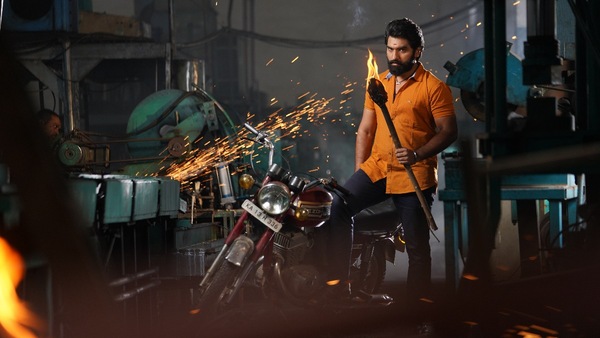Benki Kannada movie review: An appalling, outdated film that isn't worth any time or money
The film marks the directorial debut of A.R. Shaan and stars Anish, Sampada Hulivana, Sruti Patil, Ugramm Manju, and others

Last Updated: 05.43 PM, Jul 15, 2022
Story:
Benki, a fiery young man, dotes his sister to the point that he won't let anything, or anyone, cause the smallest harm to her. When the sister is set to marry into a city-based family, the entire village joins in on the celebrations but things take a tragic turn when she commits suicide the night before the wedding. Unable to comprehend this, Benki then goes on a rampage to discover the reason behind her death, thus encountering a shocking truth.
Review:
Stories centered around brother-sister relationships have been a familiar facet of South Indian cinema for many decades. Each generation saw this subgenre, so to speak, take new shapes in the mainstream space but without really evolving beyond a point: instead, they became tools to exploit patriarchy and meaningless aggression to an extent that they eventually became semi-obsolete. However, one still finds films of this kind crop up every now and then, devoid of any novelty and nuance but the fact that filmmakers perceive a market for them regardless is quite baffling. Benki, starring Anish and directed by A.R. Shaan, is the latest entrant to this tasteless collection and a film so alarmingly regressive that one wonders how it ever saw the light of day. Be it the fact that the director chose to make his debut with this outdated subject or that he chose the most appalling of ways to explore the same brother-sister dynamic, Benki can be seen as a serious setback to the promising growth of Kannada cinema.
The word Benki, in the literal sense, means fire and with the film’s protagonist bearing this name, it is implied that he represents rage or fierceness and passion in equal measure. But the Benki in this case also exudes warmth, particularly towards his darling sister who, having come of age, is ready to be married. Benki is also innocent and shy, make no mistake, but when it comes to his sister’s well-being, he doesn’t mind letting his inner beast rip – in what seems like a genuine ‘K.G.F’ hangover, the film has multiple fight sequences that are slick, stylish, and mostly out of place. So, as in the case of any film of this kind, the main plot twist in Benki is meant to occur when the sister is posed with grave danger, thus compelling the hero to overcome the biggest of obstacles and fulfill his brotherly duties. This film features all this and more but to its credit, it also resists going thus far, and instead, we get to see an interesting shift in the narrative just before the interval when the sister commits suicide the night before her special day.
But that isn’t the only plot twist in the film because the second half has a few more in store. Benki’s quest to understand the reasons behind his sister’s suicide nudges the plot in an interesting direction, leaving a lot of scope for the director to subvert the genre specifications. Again, credit where it is due, the proceedings remain relatively smooth and just as one builds the hopes for a compelling climax to close it all off, the true intent of the film shows through. As though right on cue, everything built up to a particular point is obliterated in a matter of few minutes to leave the viewer perplexed: what then follows is simply an assault on the senses. With terms like “rape” and “prostitute” hurled in the most casual and unwarranted manner, combined with the absolute nonsense that surrounds the sister’s suicide, Benki becomes a most deplorable film towards the fag end. The lack of effort on the makers’ part, both in terms of writing and execution, is so apparent in these closing moments that one cringes at every passing frame.
As far as the cast is concerned, it is indeed a pity that an actor like Anish would take on a role so exasperating and outworn that it threatens to damage his credibility. Sruti Patil as his on-screen sister has a few decent scenes but the lackluster writing allows her no room to showcase any skill – in the same vein, Sampada Hulivana stars as the film’s female lead whose presence has no bearing on the storyline whatsoever. On the other hand, Ugramm Manju brings his talent to the table and even manages to elevate the film to a new height but his role too is cut short due to poor writing. Chandra Keerthi, who made his directorial debut recently with Tootu Madike, is underwhelming in the film.

 Premium
Premium